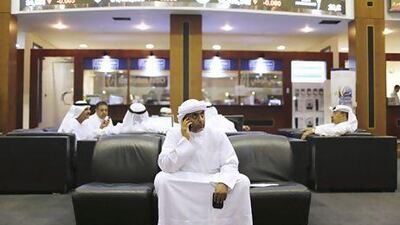The euphoria surrounding the UAE's inclusion in the MSCI Emerging Markets Index wore off yesterday as the Dubai market erased all of its gains since last week's upgrade.
The Dubai Financial Market General Index slipped 2.25 per cent to 2,345.47, breaking a three-day streak of gains to register the biggest intraday loss since March last year.
The Abu Dhabi Securities Exchange General Index fared better, but nevertheless sagged 0.84 per cent to 3,630.37.
The index provider MSCI said it would reclassify the UAE and Qatar as "emerging" markets alongside heavyweights such as Brazil and China on Wednesday morning, culminating five years of frustrated but eventually successful efforts by exchange officials.
Local markets recovered from their intraday lows but were hit hard by political uncertainty in the region, said Yong-Wei Lee, the head of equites at Emirates NBD.
"We had a good rally," he said. "We've probably seen some profit-taking. But we were very much affected by the drop in Saudi Arabia yesterday, surrounding geopolitical risk coming from Syria."
The market was also experiencing sluggish trading volumes as market activity winds down for the summer.
"We're coming to the summer months. Volumes were not very high today, and that reflects the fact that things are slowing down as we hit June and July," Mr Lee added.
Markets moved lower following a prolonged sell-off on the Saudi Tadawul on Saturday, in which shares plummeted 4.3 per cent.
Traders linked the move to King Abdullah unexpectedly cutting short his vacation to focus on the crisis in Syria.
Elsewhere in the Gulf, most other stocks moved higher. Qatar's QE Index slipped 0.5 per cent to 9,424.41 and Kuwait's benchmark rose 0.3 per cent to 7,955.12. The Bahrain Bourse held steady, up 0.01 per cent to 1,198.80, while Oman's market declined 1.12 per cent to 6,484.23.
The Saudi Tadawul All-Share Index nudged up 0.49 per cent to 7,330.48.
Qatar's central bank has also moved to tighten limits on how much its banks may invest in equity markets, Bloomberg reported on Thursday.
The sell-off comes following a surge in inflows of foreign capital to markets in the Middle East and North Africa, according to data from Deutsche Bank.
Of the US$655 million of inflows during May, Saudi Arabia accounted for $308m, followed by Qatar and Dubai with $131m and $129m respectively.
The inflows to the region represented the highest level since the bank's records began in 2009 and was set to continue, said Aleksandar Stojanovski, a research analyst at Deutsche Bank.
"The recent upgrade in the Emerging Market index of the United Arab Emirates and Qatar reflects the confidence of international investors and will further leverage the region's visibility to represent a potential $400m-$450m of incremental funds inflows for each country."

